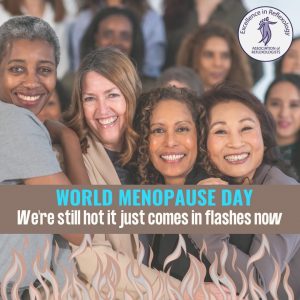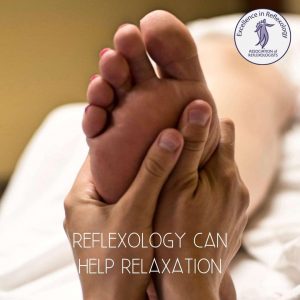October marks Menopause Awareness Month, an annual campaign to raise awareness around the natural stage in a woman’s life when her hormone levels decline, and her periods cease.
Historically, menopause has been a taboo subject. “The Change” was a topic discussed in whispers, if discussed at all. Symptoms, such as hot flushes and brain fog, were to be endured in silence. Thankfully, this is changing and over the last couple of years many celebrities have spoken out about their experiences of menopause, including Davina McCall, whose 2021 groundbreaking TV documentary, Sex, Myths and The Menopause, was reported to have been watched by more than 2 million people.
I am currently studying Reflexology for Menopause (developed by renowned reflexologist Sally Earlam), a course designed for reflexologists to develop additional skills to support women through menopause, both in terms of reflexology techniques and self-help advice.
Here’s what I’ve learned so far…
- Every woman and her experience of menopause is unique.
- A woman is said to have reached menopause when she has not had a period for 12 consecutive months.
- The average age of menopause in the UK is 51.
- Perimenopause is the transition time before menopause during which a woman may experience symptoms of falling oestrogen levels but is still having periods.
- Perimenopause generally starts between 40-50 years of age and typically lasts 4 years but it can last anywhere from 1 to 12 years.
- 8 out of 10 women in the UK experience some symptoms, the most common of which are hot flushes and night sweats. However, there are said to be around 34 recognised symptoms of menopause and perimenopause including insomnia, mood changes, decreased libido, vaginal dryness, fatigue, anxiety, depression, poor concentration, memory lapses, incontinence, itchiness, joint pain, aching muscles, headaches and weight gain.
- Post-menopausal women are at an increased risk of long-term conditions such as osteoporosis and heart disease.
- Symptoms no longer need to be endured. There are lots of effective treatments available, whether you decide to take hormone replacement therapy (HRT) or not.

The role of oestrogen
Oestrogen is one of the main female sex hormones and plays a vital role at every stage of a woman’s development, from puberty to the menstrual cycle to pregnancy. It also plays a role in bone strength and other functions of the body. In fact, women have oestrogen receptors around the whole body, including the reproductive organs, breast tissue, bones, joints, ligaments, tendons, skin, cardiovascular system, thyroid, central nervous system and gastrointestinal tract, so you can see how falling levels of oestrogen in the perimenopause and menopause can play havoc with every area of a woman’s health and her quality of life can be seriously affected.
The impact of stress on menopausal symptoms
Menopause happens at a time in her life when a woman may have higher stress levels. Often she is focussing on looking after others and not always prioritising looking after herself. She may be dealing with the following:
- A demanding job
- Teenage children or children leaving home
- Ageing parents
A study has shown that chronically elevated cortisol (a stress hormone) increases the likelihood of severe menopausal symptoms. (Cagnacci et al, 2011. Menopause, 18, 273-8) Therefore lowering stress levels may help to reduce menopausal symptoms.

How can Reflexology support women through menopause and help ease symptoms?
As a gentle, hands-on, holistic therapy, Reflexology aims to optimise physical and emotional well-being by:
- Aiding sleep
- Improving mood
- Releasing tension
- Promoting relaxation
- Improving your sense of wellbeing
If lowering stress levels can reduce menopausal symptoms, why not see how the deep relaxation from reflexology makes you feel?
In her course, Sally Earlam emphasises that menopause is a time to pause and reframe: a time to ask “who do you want to be for the next phase of your life and how can you achieve that?”.
Whilst Reflexology offers one element for taking a natural, holistic approach to menopause, Sally believes that viewing menopause through a positive lens and looking at lifestyle is also key for well-being and healthy ageing. She outlines five main ‘pillars’ of menopause:
- Diet and nutrition – a more plant-based diet, high in vegetables and fruit, low in processed food and added sugar.
- Exercise – including weight bearing, strength training, aerobic exercise, flexibility and balance.
- Relaxation – stress can make menopausal symptoms worse but deep relaxation allows the body to heal and repair which can ease symptoms. This is where reflexology can help, as well as building in daily relaxation practices, such as meditation.
- Sleep – sleep disturbance is common in menopause. Cultivate a good sleep routine to ensure you are getting adequate, good quality sleep.
- Having a sense of purpose – finding your flow. What lights you up? What is your reason for getting out of bed in the morning?
I hope to complete my practical studies in Reflexology for Menopause in the next couple of months to enable me to start supporting women going through this key transitional stage in their lives.
For now, I will leave you with this final thought from Sally:
“Menopause can be a new beginning: a time when our sense of purpose as women can change enormously.
An opportunity for transformation and growth”.
